Drexel University College of Medicine's MD/PhD program is home to some of the most truly gifted and driven students. Learn more about where they're from, what current students are doing and what our alumni have accomplished since graduating.
Konstantin is currently in the PhD portion of the program with a diverse research background. Prior to joining the MD/PhD program, he investigated the impact of the APOBEC3 cytosine deaminase family on genome instability and malignancy. During the summer after first year of med school, Konstantin was involved in a project that investigated factors in sarcoma microenvironment that influence the development and function of mononuclear phagocytes of the innate immune system. He is currently pursuing his PhD under the mentorship of Dr. Jonathan Chernoff at Fox Chase Cancer Center. His project investigates the role of KRAS mutation in colorectal adenocarcinoma, specifically focusing on the signaling differences between KRAS G12D and G12V mutations, and if these differences are sufficient to form the basis for KRAS-mutant specific therapies.
Awards:
- 2017 Discovery Day 1st Place: Outstanding Medical Student Poster
- 2016 Discovery Day Honorable Mention: Outstanding Medical Student Poster
Publications:
- “A Facile Method to Engineer Mutant Kras Alleles in an Isogenic Cell Background”
Budagyan K, Chernoff J
Methods Mol Biol. 2021;2262:323-334. doi: 10.1007/978-1-0716-1190-6_20. PMID: 33977487
- “Tumor-Derived Retinoic Acid Regulates Intratumoral Monocyte Differentiation to Promote Immune Suppression”
Devalaraja S, To TKJ, Folkert IW, Natesan R, Alam MZ, Li M, Tada Y, Budagyan K, Dang MT, Zhai L, Lobel GP, Ciotti GE, Eisinger-Mathason TSK, Asangani IA, Weber K, Simon MC, Haldar M
Cell. 2020 Mar 19;180(6):1098-1114.e16. doi: 10.1016/j.cell.2020.02.042. Epub 2020 Mar 12. PMID: 32169218; PMCID: PMC7194250
- “Cytosine Deaminase APOBEC3A Sensitizes Leukemia Cells to Inhibition of the DNA Replication Checkpoint”
Budagyan K, Green AM, Hayer KE, Reed MA, Savani MR, Wertheim GB, Weitzman MD
Cancer Res. 2017 Sep 1;77(17):4579-4588. doi: 10.1158/0008-5472.CAN-16-3394. Epub 2017 Jun 27. PMID: 28655787; PMCID: PMC5581702
- “APOBEC3A damages the cellular genome during DNA replication”
Green AM, Landry S, Budagyan K, Avgousti DC, Shalhout S, Bhagwat AS, Weitzman MD
Cell Cycle. 2016;15(7):998-1008. doi: 10.1080/15384101.2016.1152426. PMID: 26918916; PMCID: PMC4889253
Back to Top
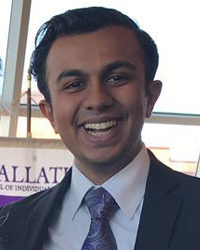
Margish is a second-year medical student with a research background exploring basic neuropathological mechanisms and testing immunomodulatory therapeutic compounds for Alzheimer's disease using mouse and monkey models at NYU and cell culture models at Regeneron. At Drexel, he completed summer laboratory rotations with the Von Reyn Lab and the Gaskill Lab and is interested in pursuing neuroimmunology research questions using cell culture models. Margish enjoys hosting stargazing events for the DUCOM Astronomy and Space Medicine Club, planning strenuous hikes for the Hiking Club, and facilitating Portrait Walks for the Arts Appreciation Club. He also serves as a Medical Scholar for the first-year Neuroscience curriculum and is a Co-Coordinator of the Nationalities Service Center Health Outreach Project. Recently, Margish has developed an intense passion for squash (the sport) and zesty salad bowls (without squash).
Back to Top
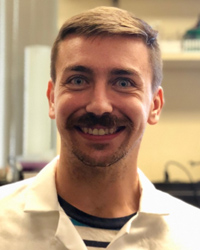
Kyle is currently in his 2nd year of the PhD portion of the dual program in the Neurobiology and Anatomy department. His focus is on the contribution of dopamine in opioid use disorder and how the hypocretin/orexin neuropeptide influences both dopamine and opioid craving. He plans to also delve into how opioids work to impact dopamine transmission in specific reward-related brain regions and how this information can guide future pharmacotherapies. He is under the mentorship of Dr. Rodrigo España.
Awards:
- 2018 Discovery Day 3rd Place: Outstanding Medical Student Poster
- 2019 Award for Outstanding Community Service
Publications:
- "A Comparative Analysis of Online Versus in-Person Opioid Overdose Awareness and Reversal Training for First-Year Medical Students, Substance Use & Misuse"
Nathaniel C. Goss, Benjamin Haslund-Gourley, Dakota M. Meredith, Andrew V. Friedman, Vishnu K. Kumar, Kyle R. Samson, Ethan J. Fitzgerald, Shraddha Damaraju, James E. Verdone, Jacob Edelman, Troy J. Anlage, Daniel G. Albrecht, Savannah R. Gorisek, Ann Carnevale & Annette B. Gadegbeku
DOI: 10.1080/10826084.2021.1958866 (2021)
Back to Top
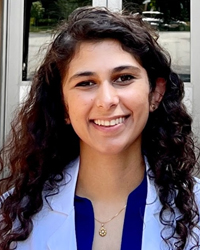
Sharada is a third-year medical student at Drexel with a research background in Zika virus, HIV, and SARS-CoV-2 dynamics. She earned her bachelor's degree in human biology with a minor in global health at UC San Diego, where she worked at Scripps Research on a variety of projects related to arbovirus detection and surveillance. Following her graduation, Sharada worked at the National Institutes of Health as a post-baccalaureate research fellow to elucidate the mechanisms of the latent viral reservoir in individuals living with HIV as well as the relationship between symptomatology and antibody response in people infected with SARS-CoV-2. These experiences developed her strong interests in infectious disease, immunology, and public health. As a physician-scientist, she hopes to develop treatment and diagnostic tools for populations affected by viral pathogens.
During the first two years of medical school, Sharada was co-president of Drexel's American Medical Association chapter, co-president of the Internal Medicine Interest Group, and a clinic coordinator for St. Raymond's HOP clinic. She is currently completing her clinical clerkships prior to her PhD. In her free time, she enjoys road-tripping, hiking, and exploring the Philadelphia food scene.
Back to Top
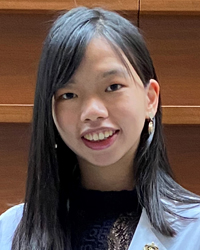
Vicky is a first-year medical student with a research background in basic and translational, and clinical settings. During her undergraduate years at the University of Washington, Seattle, she studied biochemistry and worked in research labs focusing on the Alternative lengthening of telomeres in cancer cells, treating synaptic damages caused by sleep deprivation with phenylbutyrate, and testing the biocompatibility of artificial antigen-presenting cells—Intracellular hydrogelated dendritic cells. After graduating, Vicky worked as a medical scribe in the Trauma ICU and the rheumatology departments at the University of Washington Medical center and worked as a nursing assistant at the Seattle Children's Hospital. She is currently interested in continuing research in neuroimmunology and is excited to explore therapeutic mechanisms for neurodegenerative diseases. Outside of school and research, Vicky enjoys photography and hiking.
Back to Top
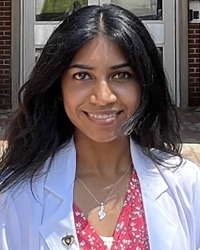
Keerthana is a second-year medical student with a diverse research background. During her undergraduate years at the University of Maryland, College Park, she studied bioengineering and worked in a basic science research lab focusing on the efficacy of 3DNA nanocarriers for targeted drug delivery. She has additional experience in clinical research evaluating diagnosis and treatment options for Lyme Disease. After graduating, Keerthana completed a 1-year post-baccalaureate research fellowship at the blood damage laboratory in the FDA assisting the effort to improve the sensitivity and applicability of an in vitro flow loop, which can differentiate the thrombogenicity potential of blood contacting medical devices. These experiences cultivated her research interests in biomaterials, tissue engineering, and devices, which she continued to study in her research rotations this summer at Dr. Kara Spiller's and Dr. Amy Throckmorton's lab.
Aside from research and school, she is the co-president of Pediatric Aids Benefit Concert (PABC), DUCOM stories in medicine, and South Asian Medical Students Association (SAMSA). She is also the health outreach coordinator for the ARC clinic and a member of DUCOM doctor's note. In her free time, Keerthana is an Indian classical dancer and enjoys singing and playing the piano.
Back to Top
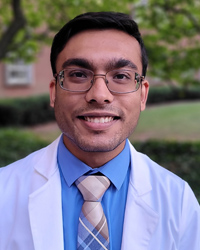
Yash is a first-year Pharmacology & Physiology PhD student in the Gaskill Lab, where he studies dopamine-mediated neuroinflammation in induced pluripotent stem cell (iPSC)-derived microglia and neurons during HIV infection. Before beginning his MD/PhD training Yash developed patient-derived xenograft (PDX) humanized rodent models for translational studies in infectious disease and cancer at the University of Pittsburgh School of Public Health. At Drexel Yash is integrating his educational background and passion for neuroscience with his experience in immunology research to identify neuroinflammatory mechanisms that drive neuropsychiatric and neurodegenerative illness. After completing his training, Yash aims to pursue a clinical career in cognitive neurology and direct his research efforts towards developing novel therapeutics that can improve quality of life for aging patients. Outside of the lab Yash is an avid musician, a passion he shares with the community by playing piano at a local nursing home, participating in DUCOM’s classical piano recitals, and performing in Dr. Dennis Novack’s band at the annual DUCOM Pediatric Aids Benefit Concert. He also mentors aspiring medical professionals, competes in online chess tournaments, and enjoys hiking in Pennsylvania's many parks.
Back to Top
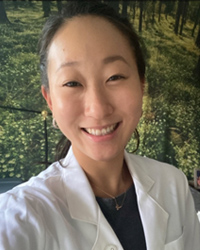
Linda has diverse research experience. She studied Chemistry and Dance at Swarthmore College, where she completed her thesis on investigating the potentials of carbon nanotubes as specialized drug carriers in chemotherapy. After Swarthmore College, Linda worked as a Research Technician at the Shorter Lab at the University of Pennsylvania. There, she studied liquid-liquid phase separation behavior of RNA-binding proteins in the context of neurodegenerative diseases such as ALS. She's interested in examining the structure/function relationships of proteins associated with neurodegenerative diseases and she hopes to pursue a career in translational medicine.
Back to Top
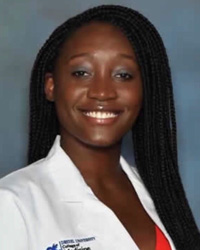
Breana is a second-year student with a diverse research background. Prior to joining the MD/PhD program, she spent two years as a research analyst looking at the role of inflammation and microbes in the gut, particularly in inflammatory bowel disease and recurrent C. difficile infection. She completed her first research rotation in the Gaskill Lab looking at dopamine-mediated macrophage immunomodulation and the effects on HIV-associated neuropathogenesis. Her current research interests include immunity, inflammatory processes and disease pathogenesis. In medical school, Breana serves as an academic coach, a gross anatomy med scholar coordinator and is a member of Doctor's Note a Capella.
Publications:
- "Single-Pass vs 2-Pass Endoscopic Ultrasound-Guided Fine-Needle Biopsy Sample Collection for Creation of Pancreatic Adenocarcinoma Organoids"
Lacomb JF, Plenker D, Tiriac H, Bucobo JC, D'souza LS, Khokhar AS, Patel H, Channer B, Joseph D, Wu M, Tuveson DA, Li E, Buscaglia JM
Clin Gastroenterol Hepatol. 2020 Feb 29:S1542-3565(20)30264-0. doi: 10.1016/j.cgh.2020.02.045. Epub ahead of print. PMID: 32119924; PMCID: PMC7483221
- "Longitudinal microbiome analysis of single donor fecal microbiota transplantation in patients with recurrent Clostridium difficile infection and/or ulcerative colitis"
Mintz M, Khair S, Grewal S, LaComb JF, Park J, Channer B, Rajapakse R, Bucobo JC, Buscaglia JM, Monzur F, Chawla A, Yang J, Robertson CE, Frank DN, Li E
PLoS One. 2018 Jan 31;13(1):e0190997. doi: 10.1371/journal.pone.0190997. PMID: 29385143; PMCID: PMC5791968
- "Loss of acid ceramidase in myeloid cells suppresses intestinal neutrophil recruitment"
Espaillat MP, Snider AJ, Qiu Z, Channer B, Coant N, Schuchman EH, Kew RR, Sheridan BS, Hannun YA, Obeid LM
FASEB J. 2018 May;32(5):2339-2353. doi: 10.1096/fj.201700585R. Epub 2017 Dec 19. PMID: 29259036; PMCID: PMC6207279
Back to Top
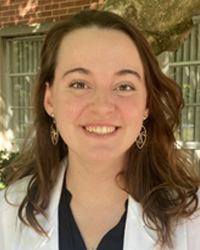
Taylor is a third-year student with a background studying psychiatric diseases in both clinical and preclinical populations. Taylor has started the PhD portion of the program, where she will complete a PhD in Neuroscience under the mentorship of Dr. Wen-Jun Gao. Taylor’s project focuses on the cellular and molecular changes that drive the therapeutic effects of psychedelic compounds in the treatment of psychiatric disease. For more details, check out her recently published review paper: “DNA methylation and the opposing NMDAR dysfunction in schizophrenia and major depression disorders: a converging model for the therapeutic effects of psychedelic compounds in the treatment of psychiatric illness.
Back to Top

Ben is entering his sixth year in the program and has returned to rotate in the clinic for his third-year medical school clerkship. He completed his undergraduate degree in Biology at the College of Creative Studies at the University of California Santa Barbara. Before entering medical school, he characterized alterations in serum glycosidase activity during human sepsis at Sanford Burnham Prebys. At Drexel, he completed his PhD working in the Comunale Laboratory within the Immunology and Microbiology Program; mentored by Dr. Mary Ann Comunale and co-mentored by Dr. Elias Haddad. During his PhD, he published first-author manuscripts in Nature Communications, eBioMedicine, Diagnostics and Frontiers Immunology. Ben investigated how host glycosylation of immunoglobulins alters the effector function of the adaptive immune response – studying Lyme disease, Fibromyalgia, Systemic Lupus Erythematosus, COVID-19 and murine vaccine responses. With support from the Institute for Molecular Medicine and Infectious Disease, Microbiology and Immunology Program, and the Coulter - Drexel Translational Research Partnership Program, Ben developed a multiplex assay that can identify an active Lyme disease infection and track patient response to antibiotic therapy over time. Outside of the lab, Ben serves as an executive advisor for the Drexel University College of Medicine Health Outreach Program (HOP) and has published papers in collaboration with the Narcan Outreach Program (NOP). Ben also founded the Microgreens Outreach Project at Drexel in 2022 and aims to increase awareness about the food-access inequity prevalent in Philadelphia communities. In addition, Ben served as the drummer in the Dennis Novak Experience (DNE) band, which plays annually at the Pediatric AIDS Benefit Concert. He also played piano at the bi-annual DUCOM Classical recitals. Ben serves as the vice president of the Board of Directors for Gateway Educational Services; a non-profit college preparatory program serving low-income students in the county of Santa Barbara, Calif. After completing Drexel's MD/PhD program, Ben plans to pursue a research career in immunology, translational medicine and diagnostic development.
Publications:
- “IgM N-glycosylation correlates with COVID-19 severity and rate of complement deposition”
Haslund-Gourley B, Woloszcuk K, Hou J, Connors J, Cusimano G, Bell M, Taramangalam B, Fourati S, Mege N, Bernui M, Altman M, Krammer F, van Bakel H, Maecker H, Wigdahl B, Cairns C, Haddad E, Comunale M
Res Sq [Preprint]. 2023 Jun 2:rs.3.rs-2939468. doi: 10.21203/rs.3.rs-2939468/v1. PMID: 37398192; PMCID: PMC10312960
- “Host Glycosylation of Immunoglobulins Impairs the Immune Response to Acute Lyme Disease”
Haslund-Gourley, Benjamin S. and Hou, Jintong and Woloszczuk, Kyra and Horn, Elizabeth J. and Dempsey, George and Haddad, Elias K. and Wigdahl, Brian and Comunale, Mary Ann
Available at SSRN: https://ssrn.com/abstract=4517321 or http://dx.doi.org/10.2139/ssrn.4517321
- “IgG N-glycan Signatures as Potential Diagnostic and Prognostic Biomarkers”
Haslund-Gourley BS, Wigdahl B, Comunale MA
Diagnostics (Basel). 2023 Mar 7;13(6):1016. doi: 10.3390/diagnostics13061016. PMID: 36980324; PMCID: PMC10047871
- “Acute Lyme disease IgG N-linked glycans contrast the canonical inflammatory signature”
Haslund-Gourley BS, Grauzam S, Mehta AS, Wigdahl B, Comunale MA
Front Immunol. 2022 Aug 5;13:949118. doi: 10.3389/fimmu.2022.949118. PMID: 35990620; PMCID: PMC9389449
- “Large-Scale Sequencing of Borreliaceae for the Construction of Pan-Genomic-Based Diagnostics”
Socarras KM, Haslund-Gourley BS, Cramer NA, Comunale MA, Marconi RT, Ehrlich GD
Genes (Basel). 2022 Sep 8;13(9):1604. doi: 10.3390/genes13091604. PMID: 36140772; PMCID: PMC9498496
- “Establishment of blood glycosidase activities and their excursions in sepsis”
Haslund-Gourley BS, Aziz PV, Heithoff DM, Restagno D, Fried JC, Ilse MB, Bäumges H, Mahan MJ, Lübke T, Marth JD
PNAS Nexus. 2022 Jul 11;1(3):pgac113. doi: 10.1093/pnasnexus/pgac113. PMID: 35967980; PMCID: PMC9364217
- “Reducing the stigma surrounding opioid use disorder: evaluating an opioid overdose prevention training program applied to a diverse population”
Bascou, N.A., Haslund-Gourley, B., Amber-Monta, K. et al.
Harm Reduction Journal 19, 5 (2022). https://doi.org/10.1186/s12954-022-00589-6
- “A longitudinal study of naloxone opioid overdose awareness and reversal training for first-year medical students: specific elements require reinforcement”
Sandhu RK, Heller MV, Buckanavage J, Haslund-Gourley B, Leckron J, Kupersmith B, Goss NC, Samson K, Gadegbeku AB
Harm Reduct J. 2022 Jul 2;19(1):70. doi: 10.1186/s12954-022-00656-y. PMID: 35780103; PMCID: PMC9250225
- “Microgreens Grow Kit: A Novel Pilot Study to Improve Nutrition Awareness”
Haslund-Gourley B, Para C, Rachuri S, Enders S, Marshall R, Mishra V, Udeh S, Nwabeke J, Gadegbeku A
Transformative Medicine (T-Med). 2022; 1(1):2-11. doi: https://doi.org/10.54299/tmed/ngfk2366
Back to Top
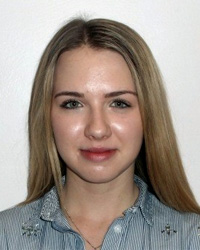
Victoria is a third-year PhD student working in the lab of Dr. John Karanicolas at Fox Chase Cancer Center. The goal of Victoria's current research is to develop computational methods to identify novel molecular glues. She completed her undergraduate degree at the University of South Florida, where she worked in a natural products chemistry laboratory. During that time, Victoria spent a summer at the NIH investigating the role of chemical chaperones on endoplasmic reticulum stress, in vitro, in a rat model of spondyloarthritis. In addition, she has also earned a master's degree at the University of Cambridge in translational biomedical research through her work understanding the balance of t-cell exhaustion and co-stimulation in patients with inflammatory bowel disease using transcriptional signatures.
Victoria plans to apply the training she is receiving at Drexel to become a physician-scientist with expertise in computational drug discovery in the areas of rheumatology or oncology.
Awards:
- F30 Ruth L. Kirschstein National Research Service Award, National Institute of Biomedical Imaging and Bioengineering (2023-2027). Topic: Developing Computational Methods to Identify Endogenous Substrates of E3 Ubiquitin Ligases and Molecular Glue Degraders
Publications:
- "Risk factors associated with the clinical outcomes of COVID-19 and its variants in the context of cytokine storm and therapeutics/vaccine development challenges"
Hanna J, Tipparaju P, Mulherkar T, Lin E, Mischley V, Kulkarni R, Bolton A, Byrareddy S, Jain P
Vaccines; PMC8402745 (2021)
- "Computational modeling of PROTAC ternary complexes and linker design"
Miller S, Andrianov G, Mischley V, Chen J, Karanicolas J
Inducing Targeted Protein Degradation (chapter 7). Manuscript in press. (2022)
Back to Top

Swaksha is a 1st year PhD student with a diverse research background in microbiology and immunology. Prior to joining the MD/PhD program, she had studied the role of adenylyl cyclase in Pseudomonas aeruginosa, the role of programmed -1 frameshifting in ribosomopathies and the immune/safety profile of CpG-ODN treatment in Leishmania major. She is currently pursuing her PhD under the mentorship of Dr. Akhil Vaidya. Her project focuses on studying the role of the antimalarial drug target, PfATP4, and the phenotypic effects of resistance associated mutations.
Back to Top